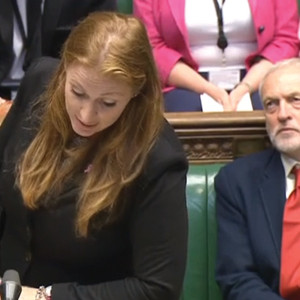The children of families who are ‘just about managing’ are “significantly under-represented” in grammar schools, the Sutton Trust has warned as it called for subsidies to give all pupils access to 11-plus test preparation.
The expansion of selection in England is a key part of Theresa May’s strategy to help people who are in work but still struggling to get by, but the Sutton Trust has urged ministers to focus on improving access to existing grammar schools before proceeding with expansion.
The latest research by the charity found pupils from families likely to be considered ‘just about managing’ by the government were “substantially less likely” to attend selective schools than those from richer families.
However the government has claimed the findings show why it is right to reintroduce grammar schools – which will have to meet new conditions aimed at widening access.
Families who are ‘just-about-managing’ are much less likely to gain a place than their better-off classmates
The prime minister has said she wants to enable more children, including those from disadvantaged backgrounds, to have access to a grammar school education, and the Sutton Trust has responded to the consultation on the plans with new research and a series of recommendations aimed at widening access.
Based on the government’s own ‘income deprivation affecting children index’, the charity found that just 11 per cent of grammar school pupils in fully-selective areas of England came from the second poorest neighbourhoods, while 34 per cent came from the richest.
In partially-selective areas, 10 per cent of pupils came from the second poorest neighbourhoods, compared to 39 per cent from the richest.
Sir Peter Lampl, the Sutton Trust’s chair, said the findings raised concerns about the government’s plans to use new grammar schools as a “vehicle for social mobility”, and said existing grammars needed to move “in the right direction”.
“We can also see that those from families who the prime minister is concerned about are ‘just-about-managing’ are also much less likely to gain a place than their better-off classmates.”
One of the main criticisms of existing grammar schools is that access is often based on the ability of parents to pay for costly private tutoring to get pupils through the 11-plus test.
The Sutton Trust said the government should provide a minimum of ten hours of test preparation for all pupils in order to “provide a level playing field”.
It also called for improved outreach work by selective schools and a “highly able fund” to support high attaining pupils in comprehensive schools.
The government has said its grammars plan will address the issues highlighted in the report. For instance, proposals state that selective schools can only expand if they meet conditions including taking a proportion of pupils from lower-income households – meaning new grammars will be more accessible.
While other pro-grammars campaigners have called for a joint focus on improving technical education.
Chris McGovern, from the pro-selection Campaign for Real Education, said he accepted that grammar schools currently did not admit enough bright pupils from disadvantaged backgrounds, and said he would welcome universal test preparation, but he warned against looking at grammar schools in isolation.
“We need to develop grammar schools alongside technical schools,” he told Schools Week.

“The Sutton Trust is coming at this from a snobbish point of view, which is that academic education is superior to technical. We should get away from this idea that Dickens is superior to Isambard Kingdom Brunel.”
McGovern also expressed concerns that the trust was looking at education “as a way of improving social mobility, when it should be about maximising aptitude”.
“Grammar schools are not the perfect solution but they are better than the alternative. Without them, we have selection based on postcode.”
Angela Rayner, the shadow education secretary, said she was “seriously interested” in the highly able fund proposals, and would “welcome more work on this”, but warned the report’s main findings showed the government was “deluded” and “locked in the past” for wanting to pursue the expansion of selection.
“The report is clear that more new grammar schools are not a vehicle for social mobility for children whose working parents are just about managing, yet Theresa May refuses to listen,” she told Schools Week.
“Every child deserves the opportunity to meet their full potential – more new grammar schools are not the answer.”
A government spokesperson said: “The Sutton Trust itself has highlighted the positive impact grammar schools can have on pupils from less well-off backgrounds and that’s exactly why we want more young people to benefit.
“Our proposals will address the issues highlighted in the report – creating more good school places in more communities and ensuring new and existing selective schools prioritise the admission of lower income pupils and support other schools to help drive up academic standards across the system.”








Your thoughts